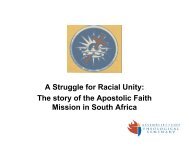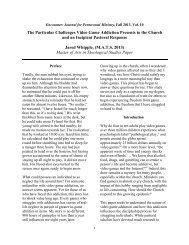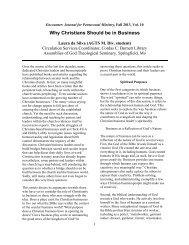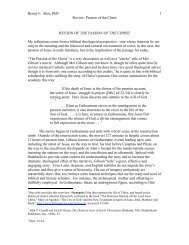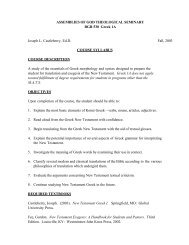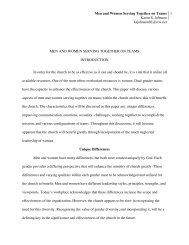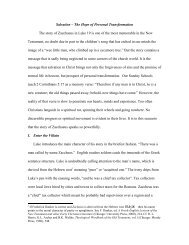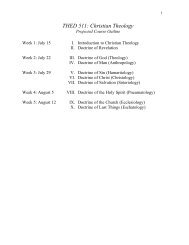Encounter: Journal for Pentecostal Ministry - Assemblies of God ...
Encounter: Journal for Pentecostal Ministry - Assemblies of God ...
Encounter: Journal for Pentecostal Ministry - Assemblies of God ...
You also want an ePaper? Increase the reach of your titles
YUMPU automatically turns print PDFs into web optimized ePapers that Google loves.
<strong>Encounter</strong>: <strong>Journal</strong> <strong>for</strong> <strong>Pentecostal</strong> <strong>Ministry</strong>, Summer 2009, Vol. 6<br />
Book Review<br />
Peace to War: Shifting Allegiances in the <strong>Assemblies</strong> <strong>of</strong> <strong>God</strong><br />
Paul Alexander<br />
The C. Henry Smith Series 9 (Tel<strong>for</strong>d, PA: Cascadia Publishing House, 2009) 426 pages<br />
Reviewed by Dr. Martin William Mittelstadt, Associate Pr<strong>of</strong>essor <strong>of</strong> New Testament<br />
Evangel University, Springfield, Missouri<br />
“Military service is incompatible with the<br />
gospel <strong>of</strong> Jesus Christ … a Christian cannot<br />
fully follow the teachings <strong>of</strong> his Lord and<br />
Master if he engages in armed conflict” 1<br />
This declaration represents the<br />
uncompromising attitude <strong>of</strong> the General<br />
Council <strong>of</strong> the <strong>Assemblies</strong> <strong>of</strong> <strong>God</strong> (AG)<br />
during the emergence <strong>of</strong> WWII. However, it<br />
also appears in a polemic context amidst<br />
shifting allegiances from an absolutist and<br />
Bible-supported pacifist position adopted in<br />
1917 to an essentially uncontested procombatant<br />
position in 1967. In Peace to<br />
War, Paul Alexander not only sets out to tell<br />
this story but also tenders a passionate plea<br />
<strong>for</strong> <strong>Pentecostal</strong>s to revisit their pacifist<br />
heritage.<br />
Early <strong>Pentecostal</strong>s applied their pacifist<br />
impulse as an integral ethical element <strong>of</strong><br />
their “down to the roots” theology. They<br />
capitalized upon theological encouragement<br />
from numerous publications <strong>of</strong> Friends and<br />
Holiness Christians including the Quakerturned-<strong>Pentecostal</strong>,<br />
Arthur Sidney Booth-<br />
Clibborn (1855-1939). Eschatological<br />
urgency, an enthusiastic focus upon<br />
evangelism, and the life and teaching <strong>of</strong> the<br />
non-violent Jesus led these <strong>Pentecostal</strong>s to<br />
their unrelenting conviction. In spite <strong>of</strong><br />
opposition from the American populace, the<br />
young AG maintained a majority peace ethic<br />
through WWI and the tenuous years be<strong>for</strong>e<br />
WWII. At the advent <strong>of</strong> WWII, the <strong>of</strong>ficial<br />
1<br />
position remained intact, but also witnessed<br />
the waning <strong>of</strong> its momentum.<br />
Alexander narrates the gradual and complex<br />
dissolution <strong>of</strong> the pacifist impulse. First, he<br />
links the decline with the rise <strong>of</strong> patriotism.<br />
Whereas early <strong>Pentecostal</strong>s held to moderate<br />
patriotism, succeeding generations succumb<br />
to nationalism; the cumulative effect <strong>of</strong><br />
WWI, WWII, Korea, Vietnam, the Cold<br />
War, Gulf War 1, 9/11, Afghanistan, and<br />
Gulf War 2 creates a culture <strong>of</strong> war whereby<br />
not only the average American but also<br />
constituents <strong>of</strong> the AG embrace a perilous<br />
blending <strong>of</strong> <strong>God</strong> and country. Second,<br />
Alexander traces the impact <strong>of</strong> a hasty<br />
alignment with Evangelicals. He locates<br />
<strong>Pentecostal</strong> invitation to and acceptance in<br />
the newly <strong>for</strong>med National Association <strong>of</strong><br />
Evangelicals (1942) as a critical event that<br />
fuels an insatiable patriotic spirit. According<br />
to Alexander, 65,000 AG soldiers in WWII<br />
(note: the ratio <strong>of</strong> combatants to noncombatants<br />
remains difficult to ascertain)<br />
may rank as the primary reason <strong>for</strong><br />
invitation <strong>of</strong> <strong>Pentecostal</strong>s to the Evangelical<br />
table. Third, Alexander equates the fatal<br />
blow with acquiescence to individual<br />
conscience. <strong>Pentecostal</strong>s surrender to<br />
pragmatic realism. Since the military serves<br />
as a vast mission field and <strong>Pentecostal</strong>s<br />
become employed in military chaplaincy,<br />
the drift away from pacifism becomes<br />
inevitable.



